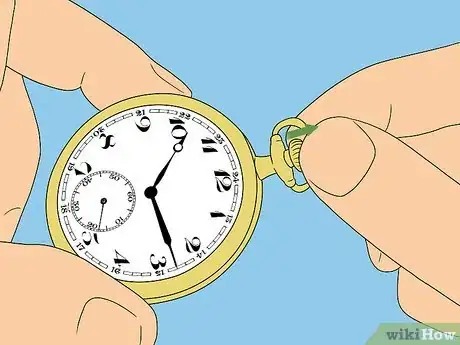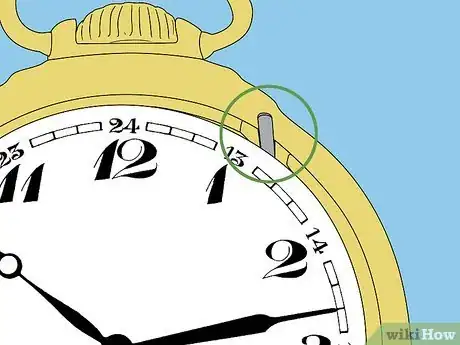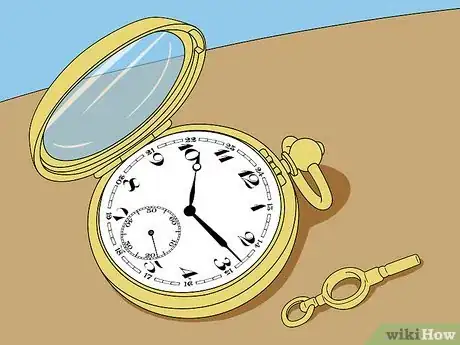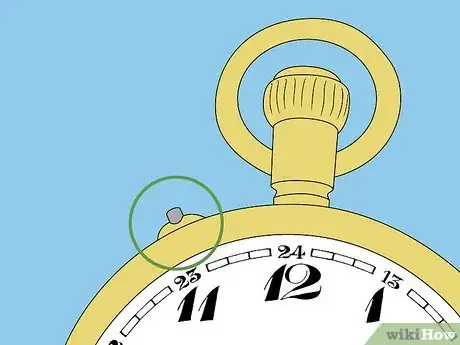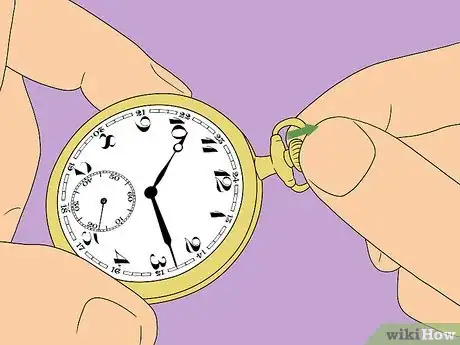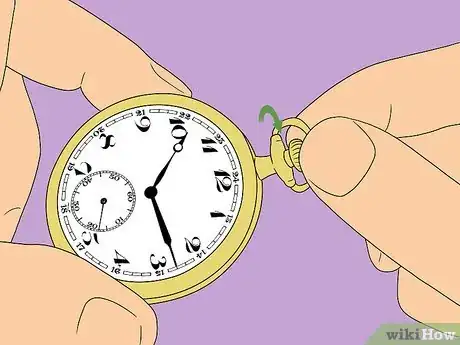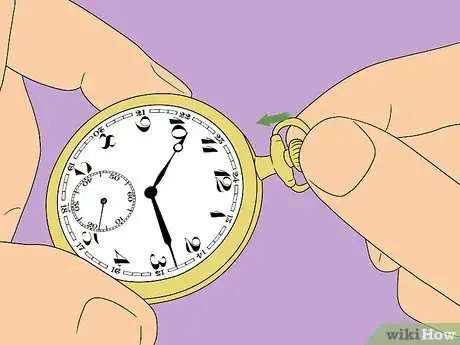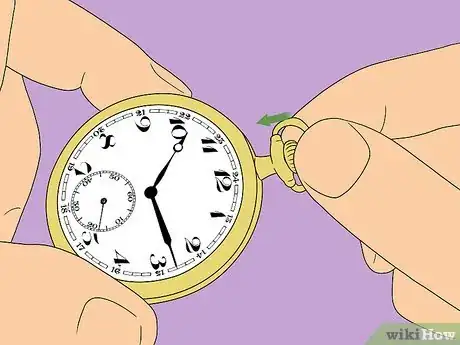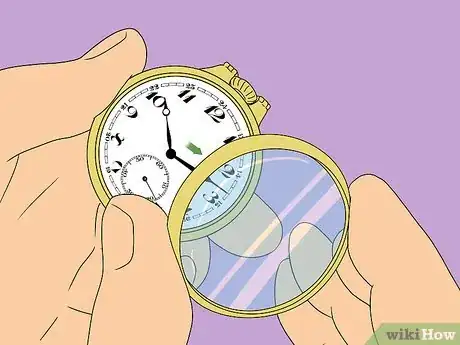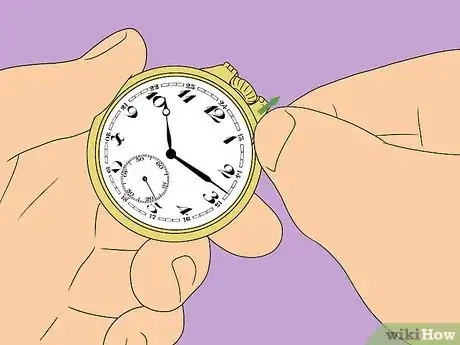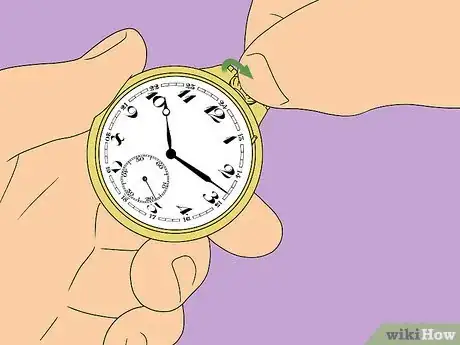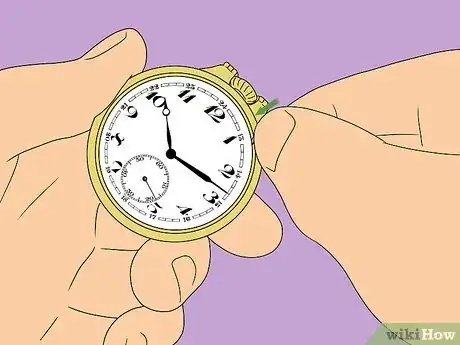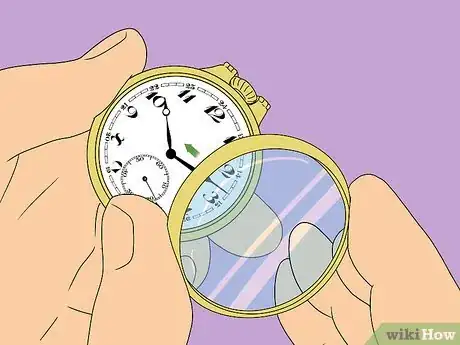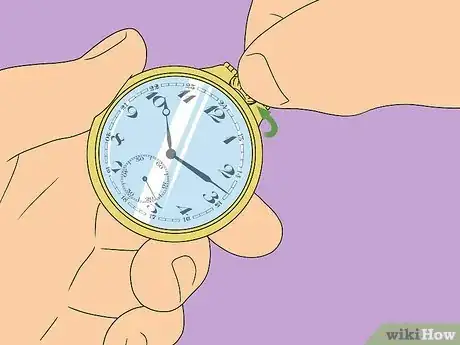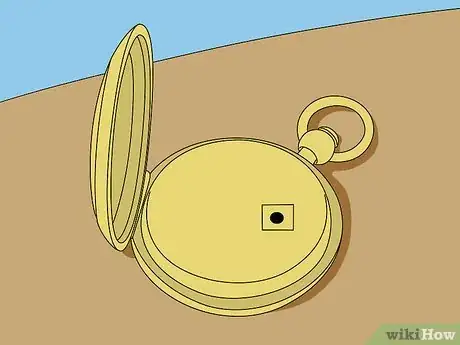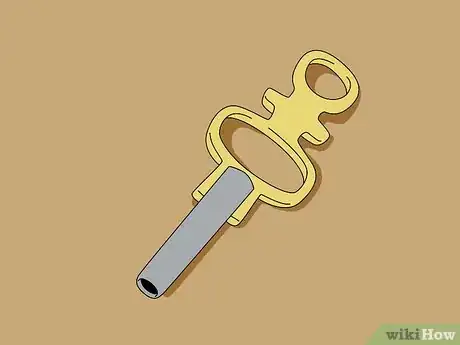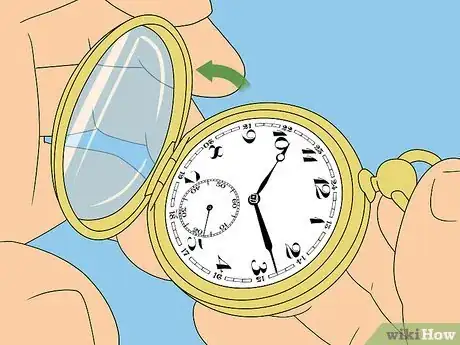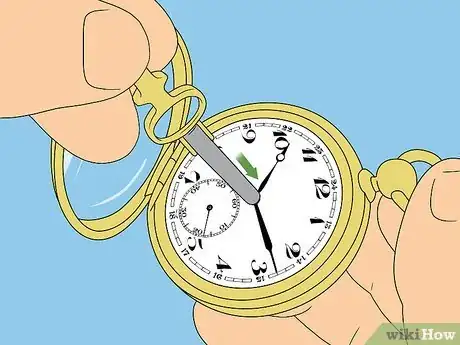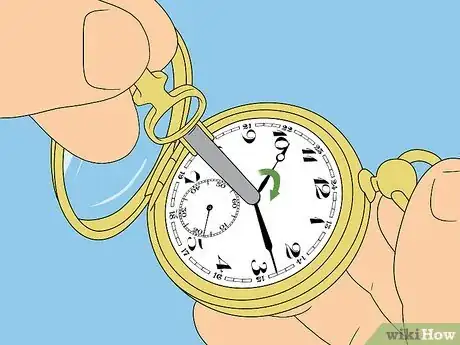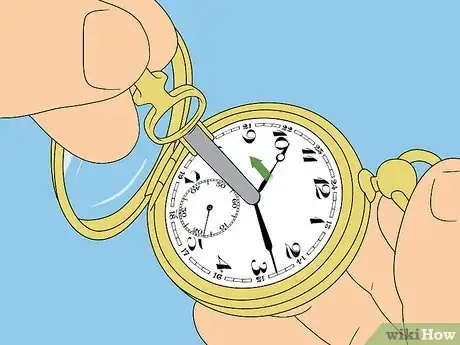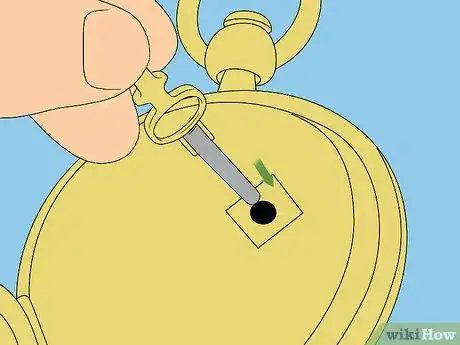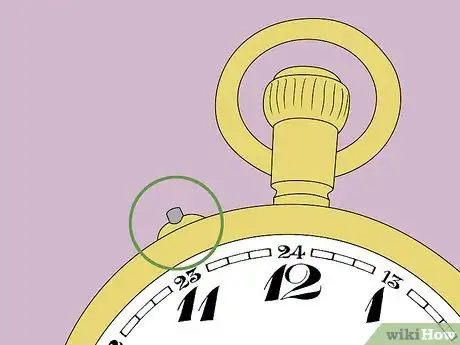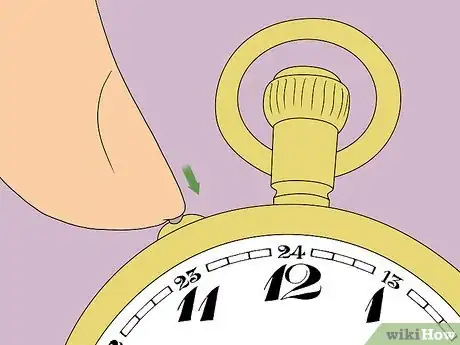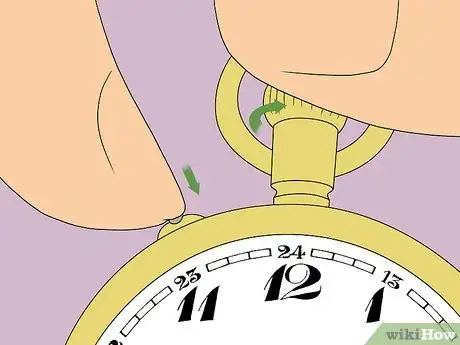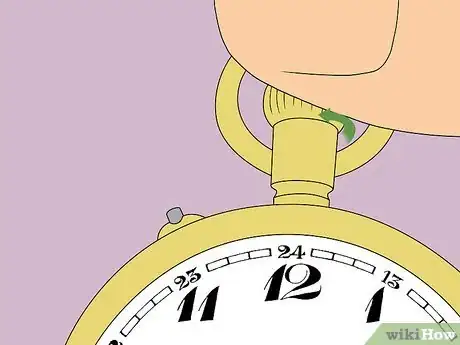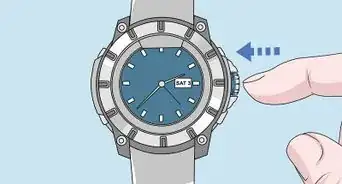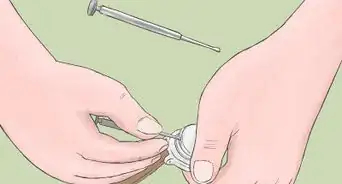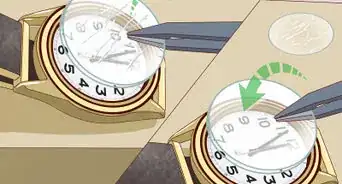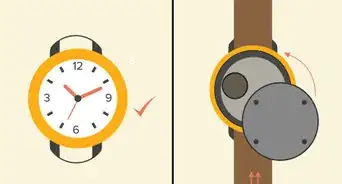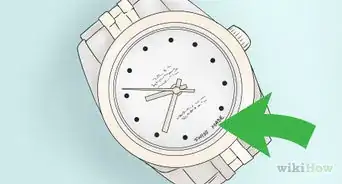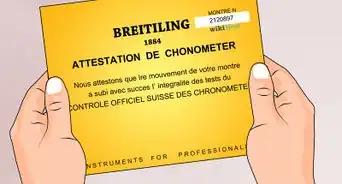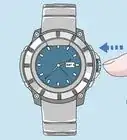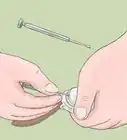This article was co-authored by wikiHow Staff. Our trained team of editors and researchers validate articles for accuracy and comprehensiveness. wikiHow's Content Management Team carefully monitors the work from our editorial staff to ensure that each article is backed by trusted research and meets our high quality standards.
There are 10 references cited in this article, which can be found at the bottom of the page.
This article has been viewed 70,085 times.
Learn more...
Pocket watches are wonderful heirloom items, but they don’t always come with a set of instructions. To change the time on your watch (which is known as setting the watch), you will need to first identify what type of pocket watch you have. There are 4 common types: key-set, lever-set, pendant-set, and pin-set. Fortunately, each type of watch is fairly simple to use and set.
Steps
Identifying Your Watch Setting
-
1Pull on the crown of the watch to see if it is pendant-set. The crown is a rotating button at the top of the watch above the number 12. Unlike other watches, the crown on a pendant-set watch will press in and pull out. If the crown moves up and down, it is a pendant-set watch.[1]
- Use gentle force to pull up on the crown. A pendant set watch should move fairly easily from 1 setting to another.
- If you have a rotating crown and there is no lever or pin button, you can assume you have a pendant watch.
- This is the most common setting in modern pocket watches.
-
2Look for a lever to identify a lever-set watch. Look for a small metal tab sticking out from under the dial. This may be hidden under the case over the dial, so you may need to remove the front case to find the lever. A lever-set watch will also have a rotating crown.[2]
- Lever-set watches are also known as railroad watches. They are more common in antique watches, but they may also appear in some modern watches.
Advertisement -
3Identify a key-set watch by the lack of a rotating crown. The easiest way to tell a key-set watch is to try to turn the crown at the top of the watch. If it won’t turn, you have a key-set watch. Furthermore, if your watch comes with a key, you can assume it is a key-set watch.[3]
- While modern watches may have a key, key setting is the oldest form of pocket watch. If your watch comes from before the late 19th century, you most likely have a key-set watch.
-
4Check for a small button near the crown to see if it is pin-set. This button may be very small, but it will be raised up from the rest of the watch. A pin-set watch will also have a rotating crown at the top of the watch.[4]
- Pin-setting is more common in European watches than American, and it is not very common in higher end watches.
Turning a Pendant-Set Pocket Watch
-
1Pull the crown up to activate the setting mechanism. There may be a snap or a click when you pull the crown up. If the crown won’t hold in this position or if the crown is stuck, take it into a watch maker or repairman.[5]
-
2Turn the crown to set the time. Turn the crown clockwise to move the hands clockwise. Turn the crown counterclockwise to move the hands in the opposite direction. Once you have reached the right time, stop turning the crown.[6]
-
3Press the crown back into the watch. The crown should now be in the middle position. Do not push it all the way in unless you want to wind your watch.[7]
-
4Push the crown down to wind the watch if needed. Pushing the crown in will activate the winding mechanism. Once the crown is pushed in, rotate the crown clockwise until it won't turn anymore. When you are done, pull the crown back up to the middle position.[8]
Adjusting a Lever-Set Watch
-
1Locate the lever on the face of the pocket watch. Where the lever is located may vary. Often, it will be hidden under the bezel and crystal (which is the glass case over the dial). Open the bezel and crystal by screwing off the lid, snapping it off, or prying it open with a finger nail.[9]
- The lever will look like a small piece of metal with a raised lip. Most of it will be hiding under the watch face.
-
2Pull the lever out with your fingernail. Use gentle pressure to pull the lever out from under the dial. The lever should easily spring out towards you. This will activate the setting mechanism. If the lever is stuck, don’t force it. Contact the manufacturer or a watch maker.[10]
-
3Rotate the crown at the top of the watch to set the time. Turn the crown to rotate the hands of the clock until they reach the right time. Turning the crown clockwise or counterclockwise will move the hands in that same direction.[11]
-
4Push the lever back into its original position. This will finish setting the clock. Use your finger nail to gently snap it back under the dial of the watch.[12]
-
5Replace the crystal and bezel case if necessary. Screw it back on or snap it back into place by pressing down on the bezel or metal rim of the case. The clock should be ready to use.[13]
-
6Wind the clock using the crown if needed. If the lever is pushed into its original position, turning the crown will wind the watch. Turn the crown clockwise to wind it. It will stop turning when it is fully wound.[14]
Setting a Key-Set Watch
-
1Determine if the key goes in the front or back. Most key-set watches have a square peg (known as an arbor) in the center of the dial. If you see a square shape raised up from the arbor, set the watch from the front. Some may be set from the back, however. If you see a hole directly in the center of the back of clock, set the watch from the back.[15]
- If there is an off-center hole in the back, it is probably for winding and not setting. Some may have 2 holes: a center hole for setting and an off-center hole for winding.
-
2Find the key to the watch. Key-set watches require a key to turn. Do not try winding the clock with your hands, as this could damage the watch. If the key is lost, you can buy pocket watch keys online or from a watchmaker.[16]
-
3Open the glass dial case if the watch has a square arbor. This case may screw off. If it doesn’t, look for a lip or indentation on the side of the watch. Use a fingernail to pry the lip up, opening the crystal front of the pocket watch. If you can’t find the lip, look on the opposite side of the watch as the hinges.[17]
- This case is called the bezel and crystal on most watches. This is the case that protects the hands of the clock. The bezel is the metal rim while the crystal is the glass.
-
4Place the open end of the key over the center arbor or in the back hole. One end of the key will have a hole. Place this hole over the center arbor. It should fit snugly over the key. If the watch is set from a hole on the back, insert the key into this hole.[18]
-
5Turn the key to change the time on the watch. You can turn the key clockwise or counterclockwise. As you turn it, the hands of the clock will move in that direction. Once you have set the clock to the right time, stop turning.[19]
-
6Remove the key from the clock before closing the case. Do not press down on the crystal, as you could break, damage, or dirty the crystal. Close the case and press down on the outer metal rim. Put the key somewhere safe until you need it again.[20]
-
7Wind the watch using the key in the winding hole. The winding hole is usually located on the back of the watch. The hole will be closer to the outside edges of the watch than the center. Turn the key clockwise. You should hear a winding noise. The key will not turn when the clock is fully wound.[21]
- In some rare cases, a key-set watch may wind counterclockwise. If the key won’t turn clockwise, don’t force it. Try turning it counterclockwise instead.
Using a Pin-Set Watch
-
1Locate the button near the winding stem. The button will be very small, but it will be raised up above the rest of the case. It is usually located on the top ridge, close to the winding stem and crown.[22]
-
2Hold down on the button with a fingernail or pin. You must keep holding this button until you are done setting your watch. Use 1 hand to hold the button steady.[23]
-
3Turn the crown to set the time. You can turn the crown clockwise or counterclockwise. Whichever way you turn the crown, the hands will move in that direction. Turn the hands until they display the proper time.[24]
-
4Release the button to wind the clock. The clock should now display the right time. If you need to, you can wind the clock by turning the crown clockwise. As long as you are not holding onto the pin button, the clock should wind.[25]
References
- ↑ http://www.pocketwatchrepair.com/how-to/setting.php
- ↑ http://www.pocketwatchrepair.com/how-to/lever-set.php
- ↑ https://www.youtube.com/watch?v=ceca1gdXJvU&feature=youtu.be&t=271
- ↑ http://www.pocketwatchrepair.com/how-to/setting.php
- ↑ https://pocketwatchdatabase.com/reference/setting-types
- ↑ https://www.youtube.com/watch?v=atF5gi7XOh0&feature=youtu.be&t=42
- ↑ http://www.pocketwatchrepair.com/how-to/setting.php
- ↑ http://www.pocketwatchrepair.com/how-to/setting.php
- ↑ https://pocketwatchdatabase.com/reference/setting-types
- ↑ https://www.youtube.com/watch?v=ceca1gdXJvU&feature=youtu.be&t=202
- ↑ http://www.pocketwatchrepair.com/how-to/lever-set.php
- ↑ https://youtu.be/ceca1gdXJvU?t=220
- ↑ http://www.pocketwatchrepair.com/how-to/lever-set.php
- ↑ http://www.pocketwatchrepair.com/how-to/lever-set.php
- ↑ http://www.pocketwatchrepair.com/how-to/setting.php
- ↑ http://www.pocketwatchrepair.com/how-to/setting.php
- ↑ https://pocketwatchdatabase.com/reference/setting-types
- ↑ https://pocketwatchdatabase.com/reference/setting-types
- ↑ https://pocketwatchdatabase.com/reference/setting-types
- ↑ http://www.pocketwatchrepair.com/how-to/setting.php
- ↑ http://www.pocketwatchrepair.com/how-to/winding.php
- ↑ http://www.pocketwatchrepair.com/how-to/setting.php
- ↑ http://www.pocketwatchrepair.com/how-to/setting.php
- ↑ http://www.pocketwatchrepair.com/how-to/setting.php
- ↑ http://www.pocketwatchrepair.com/how-to/winding.php
